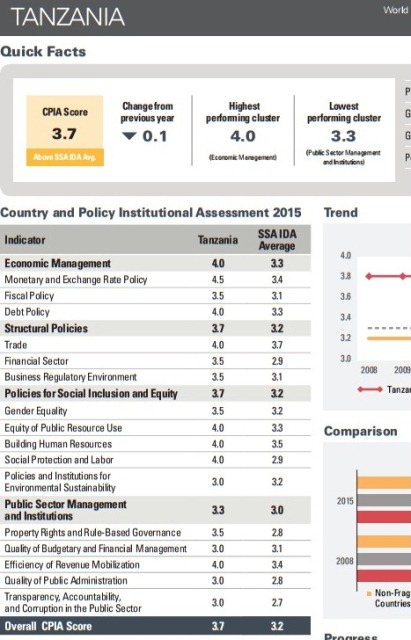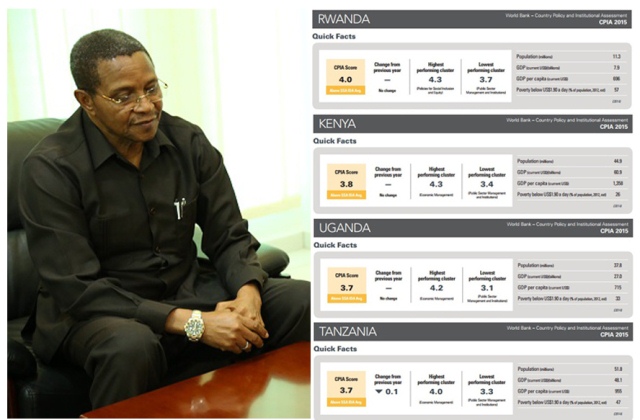Rwanda Leads EAC and Entire Sub-Saharan Africa on Economic Policy Performance Indicators.
Corruption, Lack of Transparency, Poor Quality of Public Administration contribute Toward Tanzania’s Lower Score.
By TZ Business News Staff
Rwanda has led East African countries as best performer on the latest African Country Policy and Institution Assessment (CPIA) Indices which measured important areas of economic performance in Sub-Saharan Africa during 2015.
Areas assessed included Monetary and Exchange rate Policy, Fiscal Policy, Trade Policy, the Business Regulatory Environment, Equity of Public Resource use, Building of Human Resources, Quality of Budgetary and Financial Management, Quality of public Administration, Transparency, Accountability and Corruption in the Public Sector.
On a scale of 1 to 6 with one denoting terrible performance while 6 denotes best, Tanzania scored 3.7 on this World Bank assessment–one notch below Kenya which scored 3.8 and three notches below Rwanda which scored 4.0. Tanzania’s performance was especially bad on the quality of budgetary and financial management where it scored 3.0 below the Sub-Saharan Average of 3.1.
The former President Jakaya Kikwete administration, which ended after elections in November 2015, performed above Sub-Saharan Africa in several areas of measure, but its lowest measures were recorded in the areas of transparency, accountability and corruption, where it scored 3.0 against a Sub-Saharan average of 2.8, the quality of public administration where it scored 3.0 against a regional average of 2.8, and the quality of budgetary and financial management where it scores 3.0.
Rwanda got the upper hand on economic performance when it beat Tanzania in particularly five areas. Rwanda performed better on its fiscal policy with a score of 4.0 against Tanzania’s 3.5, it had a better trade policy with a score of 4.5 against Tanzania’s 4.0, while Rwanda had a better business regulatory environment with a score of 4.5 against Tanzania’s 3.5.
Rwanda also performed better on its equity of public resource use where it received a score of 4.5 against Tanzania’s 4.0, and the building of human resource where it got a score of 4.5 beating Tanzania which received a mark of 4.0. The Sub-Saharan African average for all these areas is lower than the East African scores.
 The Africa CPIA represents scores for the 38 African countries eligible for World Bank International Development Association (IDA) support.
The Africa CPIA represents scores for the 38 African countries eligible for World Bank International Development Association (IDA) support.
CPIA scores assess the quality of countries’ policy and institutional progress using 16 development indicators in four areas: (i) economic management, (ii) structural policies, (iii) policies for social inclusion and equity, and (iv) public sector management and institutions.
Countries are rated on a scale of 1 (low) to 6 (high) for each indicator. The overall CPIA score reflects the average of the four areas of the CPIA.
A World Bank statement says the CPIA is meant to describe the progress Sub-Saharan African countries are making on strengthening the quality of their policies and institutions.
Rwanda, under its often praised Manager, President Paul Kagame, has actually led all Sub-Saharan African countries with a CPIA score of 4.0, followed by Cabo Verde, Kenya, and Senegal, all with a 3.8 score. Ghana also saw an improvement in its CPIA score from 3.4 in 2014 to 3.6 in 2015.
“The average CPIA score for Africa’s non-fragile countries was 3.5 in 2015, comparable to that of non-fragile countries elsewhere. However, Sub-Saharan Africa’s fragile countries continued to lag fragile countries outside the region, especially on governance,” the World Bank says. “In 2015, only seven countries in Africa–Ghana, Comoros, Chad, Guinea, Madagascar, Rwanda, and Zimbabwe–strengthened their governance framework compared to nine in 2014.”
Zimbabwe’s CPIA score went up from 2.2 in 2012 to 2.9 in 2015 thanks to better availability of data and information coupled with implementation of economic policies under the International Monetary Fund (IMF) staff-monitored program.
Overall, 13 countries –Burkina Faso, Burundi, Cameroon, The Gambia, Lesotho, Malawi, Mauritania, Mozambique, Nigeria, Republic of Congo, South Sudan, Togo and Zambia–experienced a decrease in their economic management score.
Countries transitioning out of violence saw modest improvements. Côte d’Ivoire, which has enjoyed four consecutive years of wide-ranging reforms and improving CPIA scores, saw stronger performance in equity of public resource use in 2015, but this did not translate into an improvement in the country’s aggregate CPIA score of 3.3.
The improving trend in Burundi’s policy environment reversed sharply with the CPIA score falling from 3.3 in 2014 to 3.1 in 2015. The Gambia continued to see further weakening of its policy framework. Its score fell from 3.1 in 2014 to 2.9 in 2015, and is below the 3.5 score in 2011.
Stronger policy performance helped boost CPIA scores in Central Africa Republic, Chad, Guinea and Niger. South Sudan and Eritrea posted the lowest CPIA score of all Sub Saharan African countries combined with a 1.9 score.





